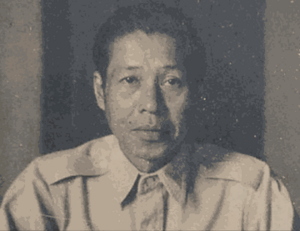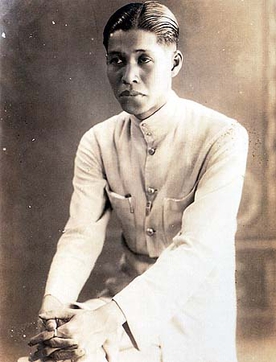Kulap Saipradit facts for kids
Quick facts for kids
Kulap Saipradit
กุหลาบ สายประดิษฐ์ |
|
|---|---|
 |
|
| Born | 31 March 1905 Bangkok, Thailand |
| Died | 16 June 1974 (aged 69) China |
| Pen name | Siburapha ศรีบูรพา |
| Occupation | Writer |
| Nationality | Thai |
Kulap Saipradit (Thai: กุหลาบ สายประดิษฐ์; born March 31, 1905 – died June 16, 1974) was a famous Thai writer. He is best known by his pen name (a name used by a writer instead of their real name) Siburapha (Thai: ศรีบูรพา). He was a newspaper editor and one of the most important Thai novel writers of his time.
Kulap was a strong supporter of human rights. Because he spoke up for what he believed in, he faced problems with the government and was put in prison for more than four years. He spent the last 16 years of his life living away from Thailand in China. This is called living in exile.
Contents
About Kulap Saipradit
Early Life and Education
Kulap Saipradit was born in Bangkok, Thailand. He went to Debsirin School, which was a school for students from richer families. However, Kulap's family was not wealthy. His father passed away when Kulap was very young. His mother worked as a dressmaker, and his sister was a classical dancer. They both worked hard to pay for his schooling.
Starting His Writing Career
In 1928, Kulap wrote three novels. Two of them became very popular: A Real Man (Luk Phu Chai) and The War of Life (Songkram Chiwit). By 1929, Kulap and his friends started a publishing group called Suphapburut, which means "The Gentlemen." Under Kulap's leadership, this group began working in journalism, writing for newspapers.
In 1934, Kulap spent three months as a bhikkhu (a Buddhist monk). During this time, he wrote a religious novel called Facing Sin (Phajon Barb). The next year, he married Chanid Priyacharnkun. Chanid later became a translator, helping to bring famous books like Jane Austen's novels and Pool by William Somerset Maugham into Thai. She also translated stories by Anton Chekhov and Maxim Gorky.
In 1936, Kulap had to stop working as a journalist for a while. Later that year, he went to study in Japan. When he came back, he wrote The Jungle of Life (Pa Nai Chiwit) and his very famous romantic novel Behind the Painting (Khang Lang Phap). Both of these stories were published in parts in newspapers in 1937. Behind the Painting was so popular that it was made into a movie twice, in 1985 and 2001.
In 1939, Kulap started writing for newspapers again. He and his group reopened Suphapburut. In 1944 and 1945, Kulap was chosen to be the president of the Thai Newspaper Association. In late 1947, he and his wife Chanid traveled to Australia for two years. There, he studied political science, which is about how governments work. When he returned, he started his own publishing company. He published his own books and those of his friends, making them affordable for everyone. He also wrote more books, including Till We Meet Again (Chon Kwa Rao Cha Phop Kan Ik).
Activism and Later Life
In 1951, when Field Marshal Plaek Phibunsongkhram was the leader of Thailand, Kulap started the Peace Foundation of Thailand. The next year, he spoke out against the Korean War. He also asked the government to stop censorship, which is when the government limits what people can say or publish.
When Kulap went to give food and blankets to people in need, he was arrested with many others on November 10, 1952. He was accused of working against the government and was sentenced to about 14 years in prison. However, he was released in February 1957. While he was in prison, Kulap wrote the first two parts of a book series called Looking Ahead (Lae Pai Khang Na), which he never finished.
In 1958, Kulap led a group of writers to China. While he was at a writers' meeting in Tashkent, there was a sudden change in government in Thailand. All the other writers from his group were arrested when they returned home. To avoid the same fate, Kulap decided to stay in China. He lived there as a "democratic personality" in exile. He taught about Thai literature at Peking University. He also helped with cultural activities and worked for China's radio service that broadcast to Thailand. Kulap passed away in China on June 16, 1974, due to health problems.
Kulap's son, Surapan, married Wanee, who was the daughter of Pridi Banomyong, another important Thai figure. In 2005, the Thai Writers' Association and UNESCO held a big celebration in Bangkok for Kulap's 100th birthday. Kulap's wife, Chanid, passed away in 2010. His son, Surapan, passed away in 2011.
Legacy and Awards
Kulap Saipradit is remembered for his important contributions to Thai literature and his fight for human rights. The Sriburapha Award, which is given every year to people who show excellence in writing, journalism, and the arts, is named in his honor.
Some of Kulap Saipradit's Works
Kulap Saipradit wrote many books and stories. Here are some of his well-known works:
Novels
- A Real Man (Luk Phu Chai; 1928)
- The War of Life (Songkhram Chiwit; 1932)
- Facing Sin (Phachon Bap; 1934)
- Behind the Painting (Khang Lang Phap; 1937)
- The Jungle of Life (Pa Nai Chiwit; 1937-1938)
- Till We Meet Again (Chon Kwa Rao Cha Phop Kan Ik; 1950)
- Looking Ahead (Lae Pai Khang Na; two volumes, 1955 and 1957)
Collected Short Stories
- Kham Khan Rap
- Kho Raeng Noi Thoe
Poetry
- Atchayakon Phu Ploi Nok Phirap
- Phalang Prachachon
Non-fiction
- Khaphachao Dai Hen Ma (1931)
- Manutsayaphap
Translations
- Pool by William Somerset Maugham, translated as Sa Sawat
- In Exile by Anton Chekhov, translated as Khao Thuk Bangkhap Hai Pen Khun Chon
- Mother by Maxim Gorky, translated as Mae
 | DeHart Hubbard |
 | Wilma Rudolph |
 | Jesse Owens |
 | Jackie Joyner-Kersee |
 | Major Taylor |


